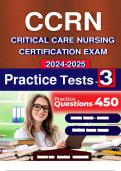CCRN
CRITICAL CARE NURSING
CERTIFICATION EXAM
2024-2025
Practice Tests - 3
Audio Book - Inside
T
Online Flash Cards
PAW LA S A R A L U K A S
,INTRODUCTION
Eligibility
Purpose of Exam
Content Outline
I. CLINICAL JUDGMENT
II. PROFESSIONAL CARING & ETHICAL PRACTICE
Author Introduction
CCRN-Adult Exam Practice Test 1
Test 1 Answer Key
CCRN-Adult Exam Practice Test 2
Test 2 Answer Key
CCRN-Adult Exam Practice Test 3
Test 3 Answer Key
Rewards
, INTRODUCTION
The CCRN exam is a test for nurses who take care of very sick patients in hospitals. It stands for the
Critical Care Registered Nurse exam. Nurses who want to take care of patients who are very sick, like
those in intensive care units, often take this test. The exam checks if nurses know a lot about taking care o
patients who are very sick. It asks questions about different parts of the body like the heart, lungs, brain,
and more. Nurses need to have a special kind of knowledge to pass this exam because taking care of very
sick patients can be very hard. Before taking the exam, nurses need to have worked for a certain number
of hours taking care of very sick patients. Passing the exam can help nurses show they are good at taking
care of very sick people. It can also help them get better jobs in hospitals.
Eligibility
To be eligible for the CCRN exam, nurses must have either: 1,750 hours of direct care for acutely ill adu
patients in the last two years, with 875 hours in the most recent year; or 2,000 hours of such care in the
last five years, with 144 hours in the most recent year. This ensures candidates have recent and sufficient
experience in critical care nursing.
Purpose of Exam
The CCRN exam is important because it helps nurses show they know a lot about taking care of very sick
patients. By passing this test, nurses can prove they have the right skills and knowledge to work in
intensive care units and other places where patients are very sick.
Content Outline
I. CLINICAL JUDGMENT
A. Cardiovascular
In this section, nurses need to understand conditions like heart attacks, heart failure, and abnormal heart
rhythms, as well as treatments like surgeries and catheterizations, to demonstrate their expertise in critica
care nursing.
B. Respiratory
In the Respiratory section of the CCRN exam, nurses must understand conditions like lung infections,
asthma, and respiratory failure. They also need to know about treatments such as mechanical ventilation
and surgeries related to the respiratory system.
C. Endocrine/Hematology/Gastrointestinal/Renal/Integumentary
In the Endocrine/Hematology/Gastrointestinal/Renal/Integumentary section, nurses must know about
conditions like diabetes, anemia, and kidney problems, as well as complications related to the
gastrointestinal system and skin. This knowledge is crucial for caring for critically ill patients.
D. Musculoskeletal/Neurological/
In the Musculoskeletal/Neurological/Psychosocial section, nurses need to understand conditions like
fractures, brain injuries, and psychological issues such as anxiety and depression. This knowledge helps
them provide holistic care for critically ill patients.
E. Multisystem
In the Multisystem section of the CCRN exam, nurses need to know about various health issues affecting
multiple body systems, including infections, shock, pain management, and end-of-life care. This
knowledge helps them provide comprehensive care for critically ill patients.
, II. PROFESSIONAL CARING & ETHICAL PRACTICE
A. Advocacy/Moral Agency
In this section, nurses must understand how to stand up for their patients' rights and make ethical decision
in challenging situations.
B. Caring Practices
In this domain, nurses must demonstrate compassion, empathy, and effective communication skills in
providing care for critically ill patients.
C. Response to Diversity
In this part, nurses must understand and respect cultural differences, providing inclusive care to diverse
patient populations.
D. Facilitation of Learning
In this section, nurses must be able to educate patients and their families effectively, empowering them to
participate in their care decisions.
E. Collaboration
In this domain, nurses must work effectively with other healthcare team members to ensure optimal patie
outcomes.




